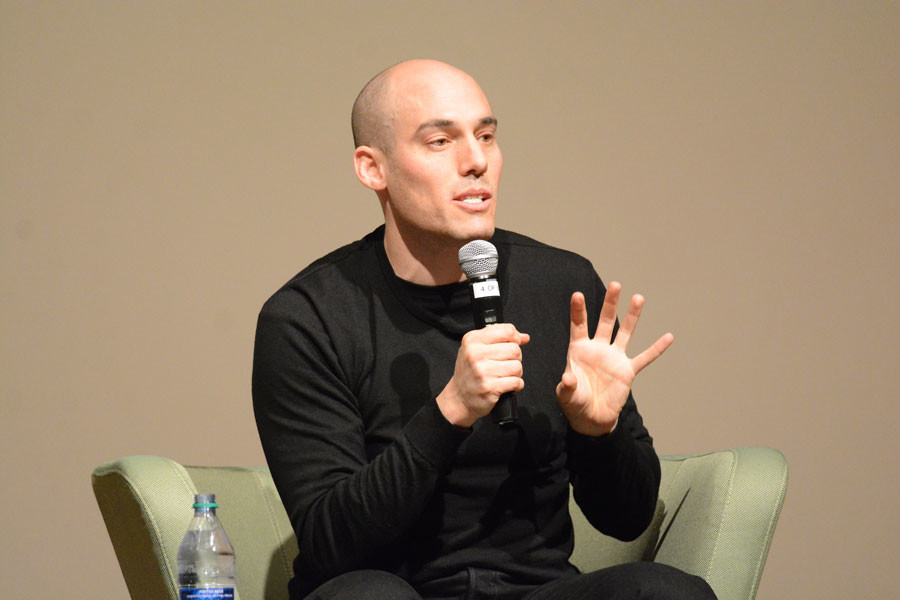Filmmaker Joshua Oppenheimer screens critically acclaimed documentary “The Look of Silence”
Sophie Mann/Daily Senior Staffer
Documentary filmmaker Joshua Oppenheimer gives a lecture on the production and experience of his most recent film, “The Look of Silence.” Oppenheimer discussed the political and psychological implications of his film, which explores the aftermath of the 1965 Indonesian genocide.
November 10, 2015
Academy Award-nominated documentary filmmaker Joshua Oppenheimer visited Northwestern on Monday to screen and lecture on his most recent documentary, “The Look of Silence,” which continues his storytelling series on the Indonesian genocide that unfolded 50 years ago.
“The Look of Silence” follows Adi, an optometrist whose brother, Ramli, was killed in the 1965 Indonesian genocide of accused Communists. According to the documentary, more than a million civilians were killed, but many perpetrators and even relatives of the victims deny the scale of the genocide.
“The name Ramli had become synonymous with the genocide as a whole because he was one of the only victims with a marked grave,” Oppenheimer said. “So even though we focus on a small part of the story, it shows a much larger picture.”
“The Look of Silence” is a sequel to Oppenheimer’s previous film, “The Act of Killing,” which focused on the perpetrators of the 1965 genocide and their glorified status in much of Indonesian society. Although “The Act of Killing” was released first, Oppenheimer said the story told in “The Look of Silence” was the one he initially set out to make when he traveled to Indonesia with his team.
The event was organized by Equality Development and Globalization Studies in the Ryan Auditorium and was followed by a Q&A. EDGS has featured Oppenheimer’s work at NU before, screening “The Act of Killing” in 2013.
Jeffrey Winters, a political science professor and the director of EDGS, said he found that the films are not only beautiful but also have significant academic benefits.
“An evening like this opens up parts of students’ minds and consciousnesses in a way that we simply can’t do in the classroom,” Winters said.
Oppenheimer’s visit to NU and other universities this week, including Stanford University and University of Chicago, coincides with the 50th anniversary of the 1965 genocide. Like Winters, the students who attended recognized the value of Oppenheimer’s films.
“When we see films like this, we have to confront the fear of acknowledging our own faults,” said Communication sophomore Jesse Simmons. “That’s a lesson we can’t be taught by someone else. We have to realize it ourselves.”
Oppenheimer said it was a very dangerous film to make because Adi confronts the men who killed his brother, and those men are still in power.
“Imagine if an African-American man whose brother was lynched in the South during segregation confronted the people who lynched him while segregation was still very much alive,” Oppenheimer said. “It would be life-threatening, and that scenario is very similar to what we experienced.”
The only reason Oppenheimer and his team were able to complete the film was that the murderers knew Oppenheimer had worked with the Indonesian vice president, military leaders and other high-ranking officers while making “The Act of Killing,” Oppenheimer said.
“The Look of Silence” was initially released in September 2014 in Italy and gained critical acclaim as it was released around the world in the following months. The film is heralded as a masterpiece of aesthetic and storytelling by the Washington Post, the New York Post, Variety and other publications.
“The Act of Killing” was nominated for the “Best Documentary” Oscar in 2014, and Winters predicted “The Look of Silence” will be nominated in the coming awards season as well.
Email: [email protected]
Twitter: @thecydneyhayes


